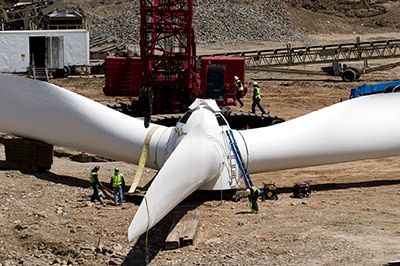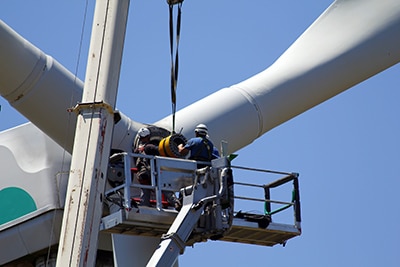Career Spotlight: Wind Technician

Everything You Need to Know to Start a Career in Wind
Arcelious Bailey is a Project Manager for System One’s Renewable Energy, Construction, and Engineering group, where he focuses on wind energy.
Having been in the industry since 2007, Arcelious got his start in the field as a Hole Watch, getting promoted quickly due to his aptitude and work ethic.
His passion for the field is palpable, and he stands out as a true expert in wind energy.
Wind Technician Q&A with Arcelious Bailey
System One: What drew you to wind energy?
Arcelious: I used to work for a utility in Houston as a meter reader. I hated it. Absolutely hated it. I cannot count the amount of times I was chased by a dog when I had to get in someone’s backyard, or even how many times homeowners pulled guns on me, because here I was, a random guy they didn’t know trying to get into their backyard.
It was during this time that a friend of the family suggested that I come work in wind energy with him. My friend did warn that he traveled quite often, which was a bit of a deterrent for me since I’m married, but my wife was all for it. So, I jumped in! I officially joined the wind industry in 2007.
System One: What did your career progression look like?
 Arcelious: I started at the bottom. My title was Hole Watch, which was literally watching who went in and came out of the rotor. That’s all I did for two months.
Arcelious: I started at the bottom. My title was Hole Watch, which was literally watching who went in and came out of the rotor. That’s all I did for two months.
I slowly worked my way up the ladder, rung by rung. I was promoted to Hole Watch Lead, then started building the towers, then moved to a Technical Advisor role. In that role, I couldn’t touch a tool anymore – I just directed people on how to put towers together correctly.
In 2010, I transitioned from building turbines to composites. The company I worked for built blades, and I started at the bottom again.
Blade work is a very niche field – it’s a skilled labor force. The wind field is arching towards composite-oriented techs. Those techs will be paid the most money. That’s where the future is going. The only downside is the long days. When you work on fixing towers, you’re working 8 to 10 hour days. But with composites, one repair by itself can take 8 hours – so with cleanup, you’re looking at 12 hour days.
System One: Can you give us an idea on salaries in the industry?
Arcelious: When I first started, I was making $17.50/hour. The highest I was paid was $36/hour as a Site Manager.
System One: What’s the most basic knowledge someone needs to have in order to be successful as a wind tech?
Arcelious: A great understanding of decorum [laughs]. That’s the most basic, and it’s hard for a lot of people that come into the wind industry. I had no experience when I joined, but I understood when to talk and who to talk to, and I always arrived to sites early.
I’d also say it’s paramount to never think you know everything. There’s always something new to learn, and you should be learning something new every day. You get to work with tons of other people who all have life experience, so take some time to learn from them.
In terms of technical knowledge, there are schools, but in my personal opinion, schools that teach you mechanics aren’t really needed. When you get a job in wind and you go to a site, that’s where you learn. It’s all on-the-job, hands-on training. Now, there are schools popping up for composite training – that, I support whole-heartedly. Composites are more complex and you do need a little bit of understanding before coming on site and working.
System One: Any advice for people looking to get into the field?
 Arcelious: This is a rough field. A lot of people come into wind thinking it’s a 10-year career. They don’t think about advancement to my level, where I work in an office as a Project Manager. They just think about being a technician, and that’s it.
Arcelious: This is a rough field. A lot of people come into wind thinking it’s a 10-year career. They don’t think about advancement to my level, where I work in an office as a Project Manager. They just think about being a technician, and that’s it.
I think that’s because most people who come into the field didn’t go to college. But there is growth, there is advancement. My advice would be to come in with the intention of making this a career, and make personal growth a mission. This can be a lifelong career with office opportunities – you won’t need to work in the field forever.
System One: What's an average day for you?
Arcelious: I handle all projects in the wind office, so an average day can look like this:
- I put out fires. A good part of my day is spent doing this.
- I screen a lot of wind technicians before sending them to sites. That way, clients get the right tech for what they need.
- I provide technical advice – for example: turbine work, what’s needed if we submit this contract or that contract.
- I handle shipping equipment, site issues, and technician issues. If a tech has a problem on a certain site, I listen to them and figure out what they need in order to do the job.
- I pursue business development opportunities, attend sales meetings, and respond to emails and phone calls.
Usually, my days start to slow down a bit around 1pm. That’s when I get to work on other projects. For example, I recently completed an in-house mentorship training program – the System One Wind Technician Lead Mentoring and Training Program. I will be teaching wind technicians about growth opportunities in the field. It’s very dear to me – and it’s great to see System One investing in their wind technicians.
System One: Are there any pitfalls or mistakes you made earlier in your career you’d caution others against?
 Arcelious: A lot of it has to do with money. Wind technicians make about $2,800 per week. That’s an awful lot of money. But they don’t save. No IRAs or 401(k) – or even just a plain old savings account.
Arcelious: A lot of it has to do with money. Wind technicians make about $2,800 per week. That’s an awful lot of money. But they don’t save. No IRAs or 401(k) – or even just a plain old savings account.
We had a tech who made $4,000 per week and he was broke. I just couldn’t wrap my head around that. Offseason in the wind industry is between October to February. That doesn’t change. So you would think this guy would have the foresight to save some of his paycheck for the months without work, right? You would think, but no. No money saved.
Personally, I wish I started saving earlier. I also wish I had thought more about my growth process. I’m in the process of getting quotes for different programs to get my PMP. If I had gotten my PMP a few years ago, I would have progressed much further into my career.
Education, growth, and finances. Take that stuff seriously.
System One: What have been the most important skills you’ve learned?
Arcelious: I have become mechanically-inclined. I can build towers from the ground up. And blades.
When I’d come home from job sites years ago, my wife would ask me to fix stuff around the house and I used to say I don’t know how to do that. But I thought to myself, “Wait a minute… you can build a tower, but you can’t fix a faucet?”
Now, I can fix anything. Plus, it’s something I’m sharing with my son. We work with our hands, together. We don’t pick up the phone and call a repairman, we do it ourselves. It’s a great way to spend time together and bond.
Job outlook
Wind technician is the 2nd fastest-growing job overall. Not only that, but employment is projected to grow 57% from 2018 to 2028. This will result in roughly 3,800 new jobs.
Working in wind is dependent on location: wind farms are generally more prevalent in the Great Plains, the Midwest, and along coasts. Texas produces the most wind energy out of all states, and that’s where our wind office is located.
Pay outlook
For a job requiring no formal training, wind technicians make a very decent salary. The 2018 median salary was $54,370 per year, which equates to $26.14/hour.
As evidenced by Arcelious’ career progression, field work isn’t all there is. Wind technicians can move up to Project Manager roles, for example. There are options for office progression.
Next Steps
If a career in wind is the right path for you, submit your resume here. While we may not have wind tech jobs posted, we’re always looking for good talent. For more information on the wind services we offer, click here to learn more.
About System One
System One delivers specialized workforce solutions and integrated services. We help clients get work done more efficiently and economically, without compromising quality. For more than 40 years, we’ve built our reputation on exceptional talent, flexible delivery, and full accountability. System One’s national network spans energy, engineering, IT, commercial, scientific & clinical, legal, marketing, and beyond. System One is based in Pittsburgh, PA.
Looking for business solutions?
Explore System One

